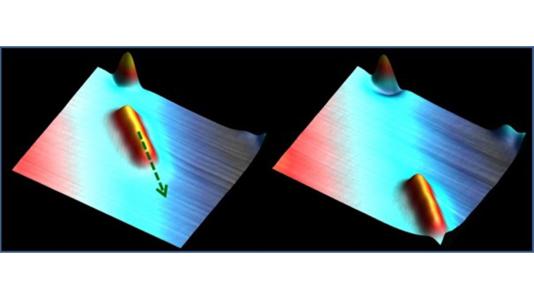
Scientific Achievement
The lateral force required to move a 1D shape molecule in the direction parallel to its molecular axis is found to be about half of that required to move it sideways, due to frictional force anisotropy traced to the shape of the molecule.
Significance and Impact
The results unveil an atomic-scale frictional phenomenon that deviates from the linear relationship of friction based on contact areas between two objects. This work impacts the understanding of friction at the atomic scale.
Research Details
- Sexiphenyl (6P) molecules were manipulated on a Ag(111) surface using q+AFM (at the Center for Nanoscale Materials (CNM)) and STM tips.
- DFT calculations provided electronic structure while MD simulations revealed propagation of the molecules; both utilized the CNM Carbon computer cluster.
Work was performed in part at CNM.
About Argonne’s Center for Nanoscale Materials
The Center for Nanoscale Materials is one of the five DOE Nanoscale Science Research Centers, premier national user facilities for interdisciplinary research at the nanoscale supported by the DOE Office of Science. Together the NSRCs comprise a suite of complementary facilities that provide researchers with state-of-the-art capabilities to fabricate, process, characterize and model nanoscale materials, and constitute the largest infrastructure investment of the National Nanotechnology Initiative. The NSRCs are located at DOE’s Argonne, Brookhaven, Lawrence Berkeley, Oak Ridge, Sandia and Los Alamos National Laboratories. For more information about the DOE NSRCs, please visit https://science.osti.gov/User-Facilities/User-Facilities-at-a-Glance.
Argonne National Laboratory seeks solutions to pressing national problems in science and technology. The nation’s first national laboratory, Argonne conducts leading-edge basic and applied scientific research in virtually every scientific discipline. Argonne researchers work closely with researchers from hundreds of companies, universities, and federal, state and municipal agencies to help them solve their specific problems, advance America’s scientific leadership and prepare the nation for a better future. With employees from more than 60 nations, Argonne is managed by UChicago Argonne, LLC for the U.S. Department of Energy’s Office of Science.
The U.S. Department of Energy’s Office of Science is the single largest supporter of basic research in the physical sciences in the United States and is working to address some of the most pressing challenges of our time. For more information, visit https://energy.gov/science.